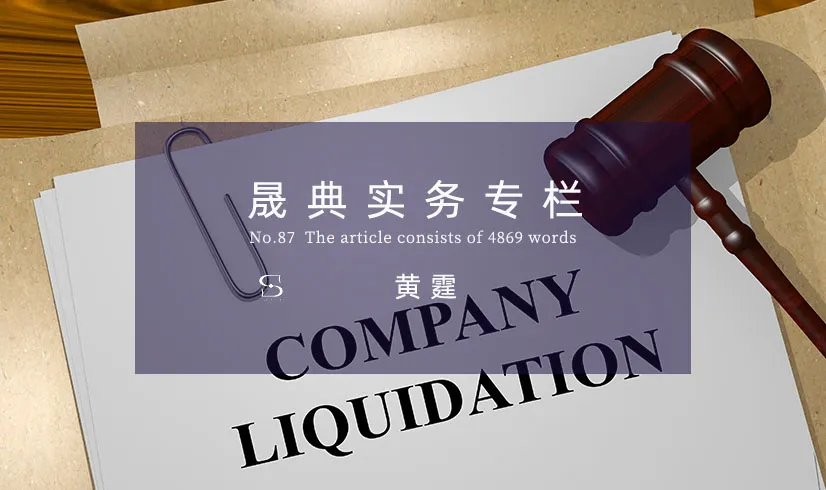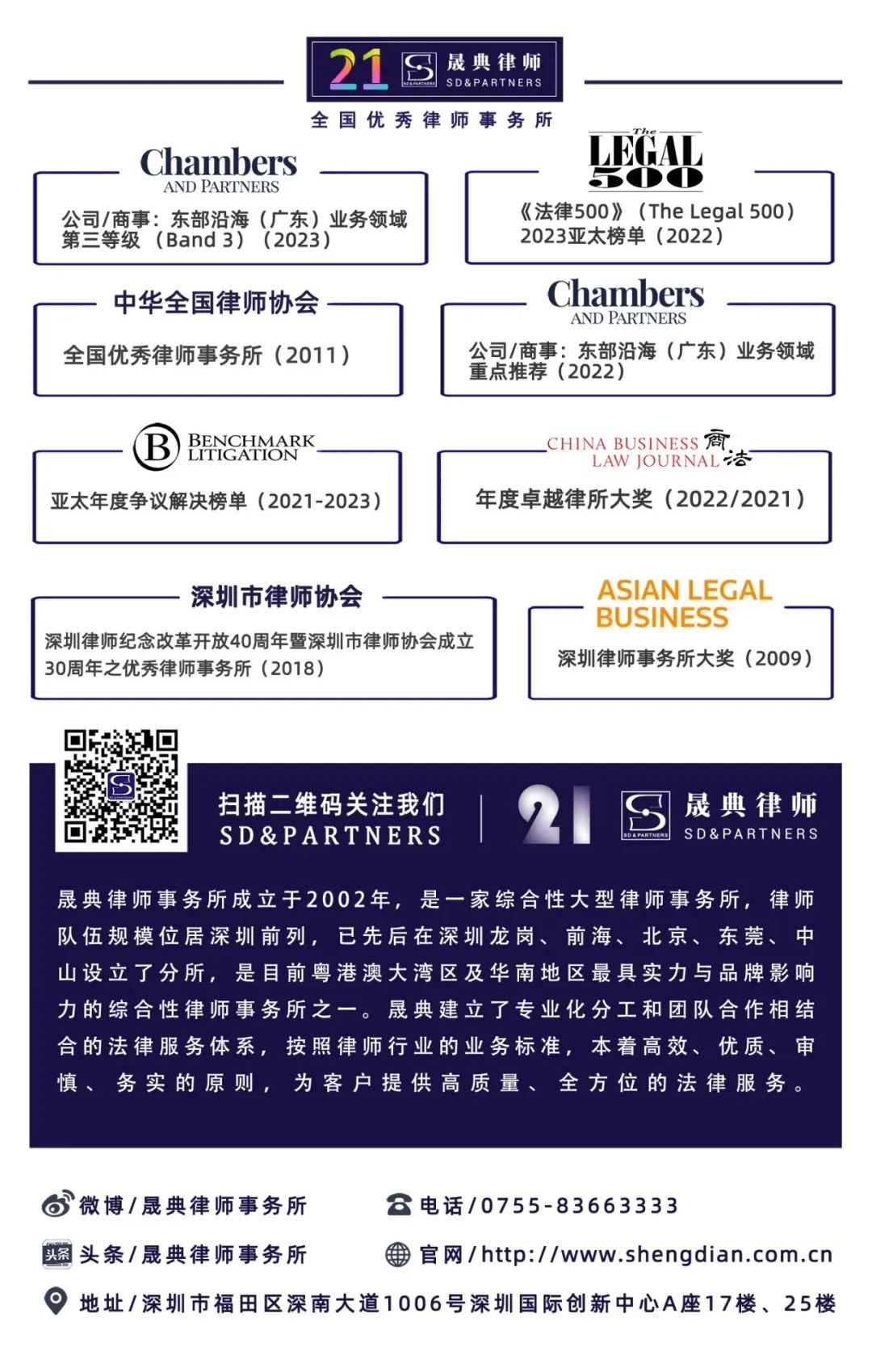Sheng Dian Practice | Huang Ting: Analysis of the Boundary of Responsibility for the Liquidation Group's Failure to Fulfill its Notice and Announcement Obligations
![]() Loading...
Loading...
![]() 2023.09.20
2023.09.20

Liquidation is the legal procedure before the cancellation of the company, and the liquidation group is the main body responsible for the liquidation. Within ten days from the date of the establishment of the liquidation group, it shall notify all known creditors of the dissolution and liquidation of the company in writing (notification obligation), and within 60 days in accordance with the size of the company and the scope of business in the country or the company's registration at the provincial level influential newspapers (announcement obligation).
Article 189, paragraph 3, of the "the People's Republic of China Company Law" (hereinafter referred to as the "Company Law") stipulates that "if a member of the liquidation team causes losses to the company or creditors due to intentional or gross negligence, he shall be liable for compensation". Article 11, paragraph 2, of the (II) of the Supreme people's Court on several issues concerning the Application of the the People's Republic of China Company Law stipulates that "if the liquidation group fails to perform the obligations of notice and announcement in accordance with the provisions of the preceding paragraph, resulting in the creditor failing to declare the creditor's rights in time and not being paid off, if the creditor claims that the members of the liquidation group shall be liable for compensation for the losses caused by this, the people's court shall support in accordance with the law". The aforementioned legal provisions and judicial interpretations have not further clarified the specific types of legal liabilities in the "liability" of the liquidation group, resulting in the current judicial practice has not yet formed a unified judgment standard. This paper intends to analyze and discuss this according to the current legal provisions.
(I) the first opinion: If the liquidation group fails to perform the obligation of notice and announcement, it shall be jointly and severally liable for all claims that the creditor has not been paid.
1. Representative Case 1: Huang Wangxiang, Lu Hedou and Wang Shu Limited Liquidation Liability Dispute
(1) The court of first instance, Xiamen Tong 'an District People's Court (2015) Tong Min Chu Zi No. 2513, held that in this case, Lu Hedu and Wang Shu, as members of the liquidation team of Yinan Company, failed to notify Huang Wangxiang in writing to declare the creditor's rights in accordance with the law, resulting in Huang Wangxiang's payment of 629295.5 yuan being unable to be paid off, therefore, in accordance with the provisions of Article 11, paragraph 2, of the (II) of the Supreme people's Court on the Application of the the People's Republic of China Company Law, Huang Wangxiang shall be liable for compensation for his losses in accordance with the law. According to the liquidation report, Yinan Company's tax has been paid, the debt settlement is zero, and the remaining property is 47966.21 yuan. Under the condition that Huang Wangxiang has been notified of liquidation and declared his creditor's rights, the upper limit of the scope of repayment is the total remaining assets of Yinan Company, 47966.21 yuan. Therefore, this amount should be determined as the loss caused to Huang Wangxiang by Lu Hedu and Wang Shuming's failure to fulfill their notification obligations according to law. Huang Wangxiang's claim for more than 47966.21 yuan lacks basis and will not be supported.
(2) Xiamen Intermediate People's Court of Second Instance (2015) Xia Min Zhong Zi No. 4421 held that Yinan Company had been canceled and Huang Wangxiang's creditor's rights of 629295.55 yuan could no longer be paid off. Therefore, there was a causal relationship between Huang Wangxiang's creditor's rights loss that could not be paid off and Lu Hedu and Wang Shulimited's failure to fulfill their notification obligations. According to the third paragraph of Article 190 of the the People's Republic of China Company Law, "if members of the liquidation group cause losses to the company or creditors due to intentional or gross negligence, they shall be liable for compensation" and the second paragraph of Article 11 of the (II) of the Supreme people's Court on several issues concerning the application of the the People's Republic of China Company Law, "the liquidation group fails to perform the obligations of notice and announcement in accordance with the provisions of the preceding paragraph, resulting in the failure of creditors to declare their claims in timely payment, if the creditors claim that the members of the liquidation group shall be liable for compensation for the losses caused by this, the people's court shall support it in accordance with the law." Lu Hedu and Wang Shulimited shall bear joint and several liability for Huang Wangxiang's creditor's rights of 629295.55 yuan and interest losses. The court of first instance took the total amount of remaining property stated in the liquidation report filed by the Administration for Industry and Commerce, 47966.21 yuan, as the scope of Huang Wangxiang's repayment and the limit of compensation liability for Lu Hedu and Wang Shulimited, which is inconsistent with the provisions of the above-mentioned laws and judicial interpretations.
2. Representative Case 2: Dispute between Ouyang Qiang, Cai Weirong and Kone Company against the interests of the Company's creditors
(1) The retrial applicants Ouyang Qiang and Cai Weirong claimed that the original court did not find out the benefits obtained by the two shareholders after the liquidation of Jiaxu Company. According to the provisions of the Company Law, the shareholders only bear limited liability and should bear the debts of Jiaxu Company to the extent of the profits obtained by the shareholders after the liquidation of the company, instead of directly determining that all the debts of Jiaxu Company were directly borne by the shareholders.
(2) The Supreme People's Court of the Retrial Court (2017) Supreme Fa Minshen No. 4056 Civil Ruling holds that: According to the (II) of the Supreme People's Court on Several Issues Concerning the Application of the the People's Republic of China Company Law, Article 11, paragraph 2, "The liquidation group fails to perform the notification and announcement obligations in accordance with the provisions of the preceding paragraph, resulting in the creditor failing to declare the creditor's rights in time and not being paid off. The creditor claims, the people's court shall provide support in accordance with the law." The original trial required the applicant, as a member of the liquidation team of Jiaxu Company, to be liable for compensation for the unpaid claims of Kone Company, in accordance with the law. The applicant believes that its announcement notice complies with the law and the reason for the application as a shareholder's liability within the scope of the profits obtained from the liquidation is inconsistent with the law, and the court will not support it.
(II) the second opinion: If the liquidation group fails to perform the obligation of notice and announcement, it shall be liable for the creditor's claims that have not been paid off to the extent of the remaining property of the company after liquidation.
1. Representative Case 1: Liability Dispute between Hangcha Group and Members of the Liquidation Group of Fan Xiying and Xu Zhong
(1) The Zhangjiagang City People's Court of First Instance (2010) Zhang Shang Chu Zi No. 613 Civil Judgment held that: Article 190 of the Company Law stipulates that members of the liquidation team shall be liable for compensation if they cause losses to creditors due to intentional or gross negligence. As a result of the above-mentioned actions of the liquidation group, the plaintiff failed to declare the claim in time and was not paid off. The two defendants, as members of the liquidation group, shall be liable for compensation for the unpaid claims of the plaintiff. The liability of the members of the liquidation group shall be within the scope of the loss of the company's property caused by their acts. In this case, the liquidation team should have compensated the creditors for their losses within the amount of the remaining property......
(2) The court of second instance Suzhou Intermediate People's Court (2011) Su Zhongshang Zhongzi No. 0630 Civil Ruling held that the defendants Fan Xiying and Xu Zhong refused to accept and appealed to the Suzhou Intermediate People's Court, but did not pay the second instance case acceptance fee in advance. This case is handled according to Fan Xiying and Xu Zhong's automatic withdrawal of the appeal, and the original judgment has legal effect.
2. Representative Case 2: Dispute over Housing Lease Contract between Ma Li Company, Zhongtai Company and Yinghaiyuan Company
(1) The retrial applicants Ma Li Company and Zotye Company believe that: Ma Li Company and Zotye Company, as shareholders of Xiamen Tus Technology Co., Ltd. (hereinafter referred to as Tus Company), the bankruptcy reorganization creditor's rights of Xiamen Ocean Industry (Group) Co., Ltd. (hereinafter referred to as Ocean Company) are different from general creditor's rights, and their value shall be subject to the creditor's rights determined in the bankruptcy reorganization plan approved by the people's court. According to the reorganization plan submitted by Ma Li Company and Zhongtai Company and new evidence materials such as certificates of obtaining cash and shares, Ma Li Company and Zhongtai Company actually received cash 219793.7 yuan and 8074 shares of shares for the bankruptcy reorganization creditor's rights, and the value of the property was not equivalent to 1900025.99 yuan of cash. Therefore, the original judgment found that Ma Li Company and Zhongtai Company were liable within the limit of 1900025.99 yuan of Qidi Company's remaining property.
(2) The Supreme People's Court (2020) Supreme Law Minshen No. 467 Civil Ruling of the Retrial Court holds that the facts involved in the case show that Yinghaiyuan Company has written to Qidi Company to claim compensation for losses before the company's liquidation, which means that Qidi Company should know that Yinghaiyuan Company is the creditor who has claimed rights from it, and Qidi Company's liquidation team should notify Yinghaiyuan Company about the company's liquidation in a clear and accessible way. Ma Li Company and Zhongtai Company, as the main body receiving the remaining property of Qidi Company, both participated in the liquidation of Qidi Company, but did not explicitly inform Yinghaiyuan Company of the liquidation and cancellation of the company, and distributed the property of Qidi Company after liquidation under this circumstance. The court of first instance held that Ma Li Company and Zhongtai Company did not clean up and calculate the unfinished contract between Qidi Company and Yinghaiyuan Company, the liquidation obligation has not been fully fulfilled, so it is not improper to judge the two companies as joint liquidation obligors to bear the corresponding liability within the scope of receiving the remaining property of the company.
1.Analysis from the perspective of joint and several liability creation
Article 178, paragraph 3, of the the People's Republic of China Civil Code provides that "joint and several liability shall be prescribed by law or agreed upon by the parties." It follows that the creation of joint and several liability can only be expressly provided for by law or agreed upon by the parties, and there is no presumption of establishment. However, the provisions of Article 189, paragraph 3, of the Company Law and Article 11, paragraph 2, of the (II) of the Supreme People's Court on Several Issues Concerning the Application of the the People's Republic of China Company Law do not explicitly stipulate that the liability of the members of the liquidation group for losses caused to creditors is joint and several liability. In addition, in the process of liquidation, unless the members of the liquidation group submit the relevant "letter of commitment" to the industrial and commercial department in order to simplify the cancellation procedure of the company, unilaterally promise that if the company has outstanding debts, the members of the liquidation group voluntarily bear unlimited joint and several liability, in general, there will be no joint and several liability agreement documents related to the settlement of creditor's rights between the members of the liquidation group and the creditors of the company.
Therefore, from the point of view of the creation of joint and several liability, if the liquidation group fails to fulfill the obligation of notice and announcement, it is not appropriate to hold that it shall bear joint and several liability for all claims that the creditor has not been paid.
2. Analysis from the perspective of limited liability of shareholders
Article 3 of the Company Law stipulates that "a company is an enterprise legal person, has independent legal person property and enjoys legal person property rights. The company shall be liable for the debts of the company with all its property. The shareholders of a limited liability company shall be liable to the company to the extent of the amount of capital contribution they have paid; the shareholders of a company limited by shares shall be liable to the company to the extent of the shares they have subscribed." Article 183 stipulates that "the liquidation group of a limited liability company shall be composed of shareholders, and the liquidation group of a limited liability company shall be composed of directors or persons determined by the general meeting of shareholders."
First of all, from the perspective of the structure of the Company Law, Article 3 of the Company Law belongs to the general provisions of Chapter I, while Article 189 belongs to the sub-provisions of Chapter 10, and the application of the sub-provisions cannot break through the regulation of the general provisions.
Second, in practice, the liquidation group of a limited liability company is usually composed of its shareholders. The core value of the modern enterprise system lies in the shareholder's liability to the company to the extent of the amount of capital contribution it has paid. If the shareholders have actually fulfilled the obligation of capital contribution and there is no situation of "lifting the corporate veil", no matter what the debt scale of the company where the shareholders are located, the shareholders themselves have no debt repayment obligation. Under this premise, if the liquidation group fails to fulfill the obligation of notice and announcement due to the procedural defects and faults in the liquidation process of the company, it is presumed that the shareholders as members of the liquidation group should bear joint and several liability for all the creditor's claims that the creditors failed to pay, there is a suspicion of breaking through the limited liability system of shareholders.
3. Liability in the current provisions should be understood on the premise of considerable causation.
Article 11, paragraph 2, of the (II) of the Provisions of the Supreme People's Court on Several Issues Concerning the Application of the the People's Republic of China Company Law clearly stipulates that the members of the liquidation group shall be liable to the creditors "for the losses caused" if the liquidation group fails to fulfill the obligations of notice and announcement, resulting in the creditors failing to declare their claims in a timely manner and not being paid off.
The author believes that the understanding of "liability for the loss caused by this" should not only start from the considerable causal relationship, but also adhere to the principle of "damage filling. First of all, if the liquidation group fails to fulfill the obligation of notice and announcement, it is determined that it should bear joint and several liability for all claims that creditors have not been paid, which will lead to a significant imbalance between the cause of the fault and the result of the fault, contrary to the equivalent of causation. Secondly, if the liquidation group performs the obligation of notice and announcement, after the creditor declares the creditor's rights to the liquidation group, the amount of creditor's rights settlement (assuming that the amount of compensation is X) can be limited to the remaining property after the liquidation of the company; that is, the loss suffered by the creditor due to the liquidation group's failure to perform the obligation of notice and announcement (assuming that the amount of loss is Y) is actually after the liquidation group performs the obligation of notice and announcement, the amount of settlement received by the creditor after declaring the claim to the liquidation group, in short, X shall be equal to Y. When X is greater than Y, the amount of repayment obtained by the creditor is greater than the amount of loss suffered by the creditor, which expands the fault scope of the members of the liquidation group and makes the creditor "gain" beyond its loss; When X is less than Y, the amount of repayment obtained by the creditor is less than the amount of loss suffered by the creditor, which further reduces the compensation scope of the members of the liquidation group and the creditor fails to receive equal compensation for the loss. Therefore, all violate the principle of "damage filling" under damages.
三. exception-the liquidation group fails to fulfill its obligations of notice and announcement, and cannot prove the remaining property of the company after liquidation, and shall be jointly and severally liable for all claims of creditors that have not been paid.
For example, in the above-mentioned case "the liability dispute between Hangcha Group and Fan Xiying and Xu Zhong liquidation group members", the Zhangjiagang people's Court of first instance held that "in this case, the liquidation group should have compensated creditors for their losses within the amount of remaining property, but the two audit reports in the trial failed to draw a clear audit conclusion due to the unfounded adjustment of the company's finance by Hangcha Zhangjiagang sales Company, the two defendants shall bear the adverse consequences and shall be presumed to have sufficient property to satisfy the creditors' claims at the time of dissolution and cancellation of the company".
That is, if the liquidation group fails to fulfill the obligations of notice and announcement, and the company or the liquidation group cannot find out or prove the remaining property after the liquidation of the company, it shall bear the adverse consequences of the inability to provide evidence, and then presume that the property is sufficient to pay off the creditor's claims when the company is dissolved and canceled, that is, the members of the liquidation group shall bear joint and several liability for all the creditor's claims that the creditor fails to be paid.
[Practice Profile] Currently a senior partner of Shengdian Law Firm, Deputy Secretary of Shengdian Party Committee, Co-head of Shengdian Bankruptcy Administrator (Level 2), Deputy Editor-in-Chief of Shengdian Lawyer Review (Law Publishing House), Director of Shengdian Publicity and Brand Promotion Committee, arbitrator of Maoming Arbitration Commission, member of the Corporate Legal Professional Committee of Guangdong and Shenzhen Lawyers Associations, and business development committee of Shenzhen Bankruptcy Administrators Association, china Coal Energy Group Co., Ltd. (first-class central enterprise), Shenzhen Baoan District Investment Management Group Co., Ltd. (first-class state-owned enterprise in Baoan District), Shenzhen Longgang Financial Investment Holding Co., Ltd. (first-class state-owned enterprise in Longgang District), Shenzhen Water Planning and Design Institute Co., Ltd. (301038.SZ, state-owned holding listed company), China Resources Property Technology Service Co., Ltd., Shenzhen Data Exchange (set up by Shenzhen Municipal Government) Data Transaction Compliance Assessment Legal Service Bank lawyer/expert, shenzhen Enterprise Evaluation Association (SZEEA), Shenzhen Dingcheng Technical and Economic Evaluation Center experts, with securities practitioners, private equity fund senior management qualifications, independent directors of listed companies.
[practice Field] company legal affairs (including consultant, equity investment and financing and dispute resolution, shareholder/partner interest dispute resolution, commercial transaction), enterprise compliance (including operation compliance of central enterprises and state-owned enterprises, anti-commercial bribery, construction and improvement of contract management system), enterprise bankruptcy liquidation (including reorganization, reconciliation, compulsory liquidation and debt restructuring), civil and commercial dispute resolution (including commercial contract disputes, foreign-related contract disputes, real estate rights, transaction and lease disputes, securities misrepresentation disputes, private equity fund disputes, etc.).



